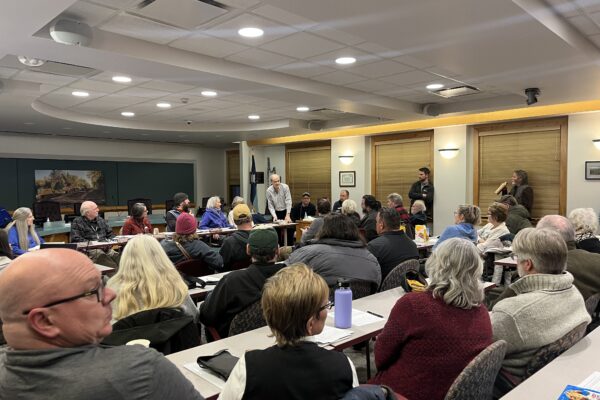County administrator talks lobbyists, technology updates, and supporting food access
On the agenda during the Oct. 28 Board of Commissioners meeting were a range of topics, including requests from the Highway and Management Information Systems Departments, and updates on resources for those in the county concerned about food security.
Protecting food access
As the community braces for the disruption of Supplemental Nutrition Assistance Program (SNAP) benefits, the county announced a new resource at the Cook County Courthouse for those who are experiencing food insecurity.
Administrator Kristen Trebil-Halbersma said the county will host a “self-serve” food bank in the courthouse lobby. There are a series of containers set up to keep donations organized by type, whether food, household, or hygiene items. As donations are added to the food bank, those in need of assistance are also welcome to help themselves to supplies. Trebil-Halbersma said there is no need to check in at all, but that the county asks that people take only what they need.
Copies of resource lists for those in need will also be available at the courthouse. Public Health and Human Services will also be offering gift cards for groceries, and for Ruby’s Pantry food distribution.
The pop-up food bank will be accessible every weekday during the hours that the courthouse is open to the public, 8 a.m. to 4 p.m.
eRrecording and updating the property tax system
County residents can expect several changes to web-based county services over the coming months. One significant change will be the roll-out of eRecording. Cook County is the last of the state’s 84 counties to adopt eRecording, which will allow record requests to be processed and fulfilled digitally. Residents will still have the option to visit the recorder’s office inside the Cook County Courthouse, but it will no longer be required in order to access records.
County Recorder Holly Schroder explained the efficiencies that the change will bring, especially for those submitting documents from afar. She said that eRecording is the standard across the state, which has created complications for Cook County, when organizations based elsewhere are attempting to submit documents. She added that the cost to the county will be a one-time setup fee of $2,600, which has already been budgeted for, and it could save both time and money currently spent sending documents through the mail.
At the Oct. 28 meeting the board also heard from Management Information Systems Director Rowan Watkins, who spoke about updating the county’s system for maintaining property tax information. He explained that the Beacon Property Information & Tax Payment system would streamline how the county is able to manage information, improve information security, and should provide a better user experience for the public.
The exact timeline for the changes to online records access and property information has not yet been announced.
Hiring a lobbyist
The commissioners approved a request from Highway Engineer Robbie Kimmel-Hass for the county to enter into contract with a lobbying firm, which he said could bring significant financial support to his department from state and federal sources. The contract, which will cost the county $300,000 over three years, will hopefully result in more funding for large infrastructure projects.
Trebil-Halbersma told WTIP that while this is the first time the county has enlisted the help of a lobbyist for a department, other Minnesota counties use this strategy. She added that increasing the amount of state and federal dollars the county is able to access for expensive highway project will help keep the costs of those projects off the county levy.
The county will enter a three-year contract, and Trebil-Halbersma said they will use that time to collect data and decide whether this will remain part of the county’s long-term strategy.
During the board of commissioners meeting, Kimmel-Hass told the board that while a lobbyist was not specified in the department’s budget, the $100,000 for each year of the contract will come from money already earmarked for consultant fees in the local project fund. “It’s not a new line item. We already have it built in there,” said Kimmel-Hass.
WTIP’s Kirsten Wisniewski spoke to Kristen Trebil-Halbersma about the most recent Board of Commissioners meeting. Audio of that interview is below.














